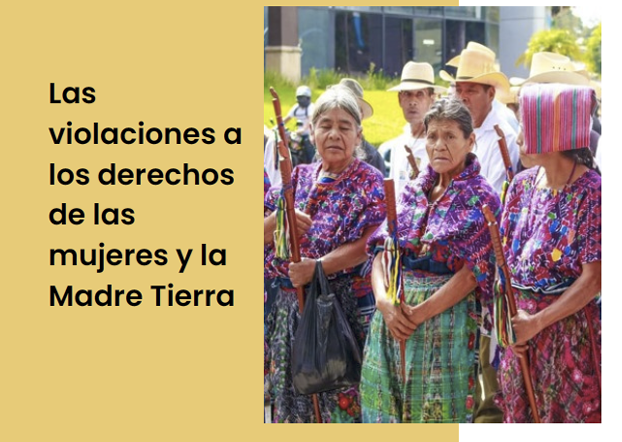International Advocacy Update, June 2024
Demanding Justice: Indigenous Women Speak Out During the UN Commission on the Status of Women
On March 12, the Indian Law Resource Center (ILRC) joined with nine other Indigenous organizations working in Brazil, Guatemala, Peru, and the United States to co-sponsor a panel, “Accelerating Empowerment of Indigenous Women and Girls in the Americas,” as a parallel event during the UN Commission on the Status of Women’s 68th Session.
“From our foundation in 1978, the Indian Law Resource Center has used human rights advocacy at the United Nations to build indigenous solidarity throughout the Western Hemisphere and create a global movement to advance indigenous rights to But because one of the projects of colonization has been to isolate our Indigenous nations and to divide us, our connections with our relatives have been torn. International advocacy events like this year’s Parallel Event can help us reconnect by creating space and time for us to re-learn about all that we hold in common with our relatives, to share our unique histories, and to support each other in our work to rebuild our nations.”
In addition to the ILRC, the co-sponsors of this event were the Alaska Native Women’s Resource Center (AKNWRC), the Coordination of the Indigenous Organizations of the Brazilian Amazon (COIAB), the Interethnic Association for the Development of the Peruvian Amazon (AIDESEP), the International Mayan League (Mayan League), the National Indigenous Women’s Resource Center (NIWRC), the Native Women’s Society of the Great Plains (NWSGP), the Regional Coordination of the Indigenous Peoples of San Lorenzo (Peru), the Regional Organization of the Indigenous Peoples of the East (Peru), and the Pouhana O Nā Wāhine (PONW).
The 90-minute virtual event featured speakers from Guatemala, Peru, and the United States. The speakers each discussed the need for long-term sustained action in their respective regions and countries to address violence to participate in Commission Parallel Events is part of this history. For Indigenous peoples in this Hemisphere we have deep cultural connections that predate the European invasion, and we also have this subsequent terrible shared experience of colonization.
“For Indigenous peoples in this Hemisphere, we have deep cultural connections that predate the European invasion, and we also have this subsequent terrible shared experience of colonization.”—CHRISTOPHER FOLEY, CHEROKEE
After the event, the ILRC shared the following recommendations for actions by the Commission on the Status of Women. These recommendations were developed and endorsed by AKNWRC, ILRC, Mayan League, Kaqchikel Maya Indigenous Community of Chuarrancho, Ancestral Authorities of Rtun Tinamit of Chwatutuy, AIDESEP, NIWRC, and PONW.
Recommendation 1:
We urge the Commission on the Status of Women to continue and deepen its engagement with Indigenous women and their rights, including, at its earliest opportunity, by designating Implementing Indigenous Women’s Individual and Collective Rights as a focus area.
Recommendation 2:
We call on the Commission to urge national governments to respect the lives of Indigenous women and children, and accelerate their empowerment by implementing the UN Declaration on the Rights of Indigenous Peoples, including by:
- Ensuring Indigenous women have access to justice, including through Indigenous peoples’ distinct political and legal institutions and juridical systems;
- Respecting Indigenous peoples’ right to maintain and develop their own political, economic and social systems or institutions;
- Fulfilling Indigenous peoples’ right to ways and means for financing these self-governance functions;
- Respecting Indigenous Peoples’ rights to their lands, territories, and natural goods of Mother Earth, including in the prevention of forced evictions and displacement through imposed development by transnational corporations which violate the rights of Indigenous Peoples, with disproportionate impact on Indigenous women and children; and
- Taking effective and special measures to ensure continuing improvement of Indigenous women’s economic and social conditions, paying particular attention to their rights and special needs.

“This event marked the 9th year of our engagement with the Commission,” remarked Foley. “In that time, our programs have helped to center indigenous women’s rights in the global women’s rights movement, and there’s so much to celebrate about what we have done and about the work that each of our partners shared this year and at each of our past sessions. But we are still having these panels and organizing these discussions because of the terrible human rights abuses Indigenous women face throughout the Americas. Moving ahead, we need to continue to find new ways to engage at the Commission and throughout the UN so that Indigenous women and our Indigenous governments can claim our rights and demand safety and justice for women and girls.”
The program, associated materials, and recordings of this year’s event in English, Spanish, and Portuguese are available at https://indianlaw.org/story/uncsw68-parallel-event.





